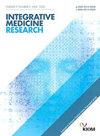针灸治疗腕管综合征的有效性和安全性:系统回顾和荟萃分析综述
IF 3
4区 医学
Q2 INTEGRATIVE & COMPLEMENTARY MEDICINE
引用次数: 0
摘要
背景多项系统综述(SR)和荟萃分析(MA)探讨了针灸治疗腕管综合征(CTS)的有效性和安全性,但研究结果不一致,质量也参差不齐。因此,本综述旨在对这些SR和MA进行批判性评估,综合现有的针灸治疗CTS的证据。方法我们使用 "针灸"、"腕管综合征 "和 "系统综述 "等关键词检索了7个数据库,检索时间从开始检索到2024年4月25日。采用 AMSTAR 2 和 PRISMA 对方法和报告质量进行了评估。结果共纳入了 9 篇相关的 SR/MA,其中 8 篇被 AMSTAR 2 判定为极低质量,1 篇被评为低质量。根据 PRISMA 核对表,发现有 7 份 SR/MA 充分报告了 70% 以上的项目,但没有一份报告了所有项目。ROBIS 评估将 4 项 SR/MA 评定为低偏倚风险,5 项为高风险。GRADE 评估的证据质量为低或极低。描述性分析表明,针灸可有效降低疼痛强度,但有关应答率、症状严重程度、功能状态和电生理参数的证据并不一致。没有发现与针灸相关的严重不良事件。然而,鉴于现有证据的局限性,针灸对 CTS 的疗效需要通过进一步的高质量研究来证实。本文章由计算机程序翻译,如有差异,请以英文原文为准。
Effectiveness and safety of acupuncture for carpal tunnel syndrome: An overview of systematic reviews and meta-analyses
Background
Several systematic reviews (SRs) and meta-analyses (MAs) have explored the effectiveness and safety of acupuncture for Carpal Tunnel Syndrome (CTS), but findings are inconsistent and vary in quality. Therefore, this overview aims to evaluate these SRs and MAs critically, synthesizing existing evidence on acupuncture in treating CTS.
Methods
We searched 7 databases from their inception to April 25, 2024, using the keywords “acupuncture”, “carpal tunnel syndrome”, and “systematic review”. Methodology and reporting quality were assessed using AMSTAR 2 and PRISMA. The risk of bias was evaluated using ROBIS, and evidence certainty was appraised using GRADE.
Results
9 related SRs/MAs were included, with 8 judged as critically low quality and 1 rated as low quality by AMSTAR 2. According to the PRISMA checklist, while 7 SR/MAs were found to adequately report over 70 %, none reported all items. The ROBIS assessment rated 4 SRs/MAs with a low risk of bias and 5 with a high risk. The quality of evidence evaluated by GRADE was low or very low. Descriptive analyses indicated that acupuncture could effectively reduce pain intensity, but evidence on responder rate, symptom severity, functional status, and electrophysiological parameters was inconsistent. No serious adverse events associated with acupuncture were found.
Conclusions
Acupuncture might be beneficial for CTS. However, given the existing evidence limitations, the efficacy of acupuncture for CTS requires confirmation through further high-quality research.
Protocol registration
PROSPERO (CRD42023409659).
求助全文
通过发布文献求助,成功后即可免费获取论文全文。
去求助
来源期刊

Integrative Medicine Research
Medicine-Complementary and Alternative Medicine
CiteScore
6.50
自引率
2.90%
发文量
65
审稿时长
12 weeks
期刊介绍:
Integrative Medicine Research (IMR) is a quarterly, peer-reviewed journal focused on scientific research for integrative medicine including traditional medicine (emphasis on acupuncture and herbal medicine), complementary and alternative medicine, and systems medicine. The journal includes papers on basic research, clinical research, methodology, theory, computational analysis and modelling, topical reviews, medical history, education and policy based on physiology, pathology, diagnosis and the systems approach in the field of integrative medicine.
 求助内容:
求助内容: 应助结果提醒方式:
应助结果提醒方式:


